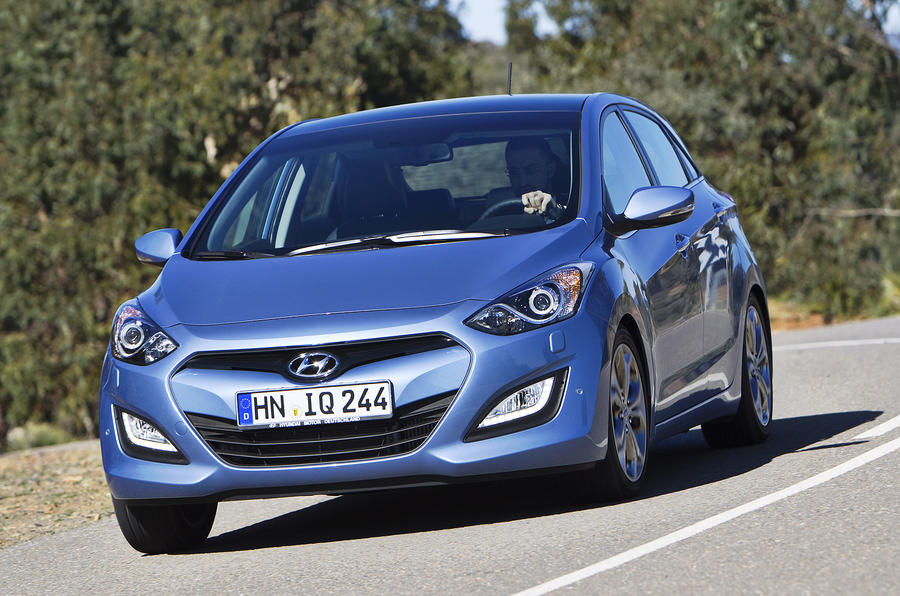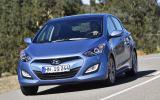What is it?
Over the past few years, reviews of new Hyundais have followed a very similar formula. One handsomely styled, dynamically competent and still well equipped and reasonably priced new model will come along to replace its fairly lacklustre predecessor notable only for its price – so think i10 for Atos, i30 for Accent or ix35 for Tucson. Good reviews duly follow.
But there’s quite a bit more at stake for Hyundai with this new i30, for it’s the first time it’s replacing one of its ‘new generation’ of cars with another all-new car.
That means Hyundai’s best-seller will not only be compared with its competent predecessor, but also increasingly strong competition in the family hatchback segment. In the four years since the outgoing i30 launched, it’s not like the class-leading VW Golf and Ford Focus have stood still.
The i30 goes on sale in the UK next month priced from a very keen £14,495 for the entry-level model. Here we test the most potent 126bhp 1.6-litre diesel model. The engine starts from £19,295, but we’re trying it out in range-topping Style Nav trim, which at £20,295 puts it firmly into Golf territory.
What’s it like?
No longer is the i30 an option merely for those with at least one eye on the pennies. Almost every aspect of the outgoing car has been improved and Hyundai has ended up with a five-door family hatchback that really can be fairly high up the list of considerations for a buyer in one of the most hotly contested market segments.
For a start it looks much more distinctive. Sure, it won’t be to all tastes, but it can no longer be mistaken for white goods. It’s a theme that continues in the spacious interior; cabin design and quality is up there with a Focus, although admittedly we were only able to experience the luxuriously appointed Style Nav model.
The 126bhp, 192lb ft diesel is impressively frugal for an oil-burner of its power. Equipped with a six-speed manual gearbox, CO2 emissions are just 100g/km and combined economy is rated 74.3mpg.
Keep the engine spinning in the peak torque band of 1900-2750rpm and it’s a fairly brisk unit. Power can rapidly drop off below this and it runs out of puff towards the 4000rpm mark, but learn to master the six slick ratios yourself, ignoring the generally misleading advice of the gear shift indicator, and progress can be swift.
The i30 rides and handles with a great deal of competence, too. Keep the i30 within its comfort zone (ie motorway jaunts and general urban pottering) as most owners will, then it’s a very gentle, softly softly kind of car. The ride is settled, and bumps absorbed far beyond an acceptable level on even the most broken of surfaces.
It’s a shame the steering and body control when cornering at low-mid speeds are not up to as much as the rest of the car. Hyundai offers the new i30 with its new ‘Flex Steer’ system, which offers three different modes for the electric steering: comfort, normal and sport. Don’t bother with comfort; it’s devoid of any feel. Sport just feels too artificially weighted and doesn’t really solve the problem of precision. Best stick with normal mode, the lesser of three evils.
Should I buy one?
There was a video that did the rounds after the i30’s reveal at the Frankfurt motor show of VW boss Martin Winterkorn checking out the car on Hyundai’s show stand. Winterkorn was suitably impressed by Hyundai achieving with the i30 little things that you’d expect to have already been achieved on the Golf but haven’t, including not being able to see the wiper blades from the inside and the steering column not making a noise when you move it.





























Join the debate
Add your comment
Hyundai i30 crdi
Get it in proportion! I wouldn't mind betting that the average time a Porche 911 takes to reach 60mph in the real world is about 25 seconds, if it gets to that speed at all on an average journey. The new i30 producing "only" 0 to 60 mph in 11 seconds with its 130bhp? Who cares? I have owned an original i30 1.6 Premium Diesel four 4 years and with "only" 109 bhp, like most turbo diesels I imagine, it pulls like a train when you really need it. After 63000 miles, if the new version is as solid and reliable, I will not be regretting my decision to cut through the badge snobbery rubbish and buying one. And keep it quiet but if you buy a year old demonstrator as I did you can fortget about depreciation problems too.
Re: Hyundai i30 1.6 CRDi
Re: Hyundai i30 1.6 CRDi
I have to say and you are all going to shoot me for saying it, but this is what the latest Focus should have been. However, £20k+ for a Hyundai is a hard pill to swallow. High spec or not, it is still a 1.6 Diesel family hatch....